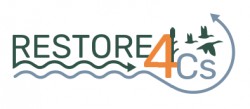
RESTORE4Cs aims to assess the role of restoration action on wetlands climate change mitigation capacity and a wide range of ecosystem services using an integrative socio-ecological systems approach. Focusing on coastal wetlands across Europe, RESTORE4Cs will deliver standardised methodologies and approaches for the prioritisation of restoration promoting carbon-storage and greenhouse gasses (GHG) emissions abatement, while improving the ecological status and the provision of additional ecosystem services such as flood regulation and coastal erosion protection. Project results will support the implementation of Climate and Biodiversity policies in the context of the European Green Deal. Effectiveness data on restoration and land use management actions on climate services and other ecosystem and socio-economic services will be gathered both from six Case Pilot sites across European coastal areas, including well-preserved, altered, and restored wetlands, and from meta-analysis. Models and integrative assessment tools will be upscaled to wider geographical (European) and ecological (other wetland types, including floodplains and peatlands) contexts using remote sensing and machine learning methods to develop an integrated status assessment of European wetlands. The results will be integrated into a digital platform to serve as a Decision Support System (DSS) for stakeholders that will steer project efforts as part of a newly created Community of Practice around wetland restoration.
Prominent role:
Pedro Coelho – Case Study Leader